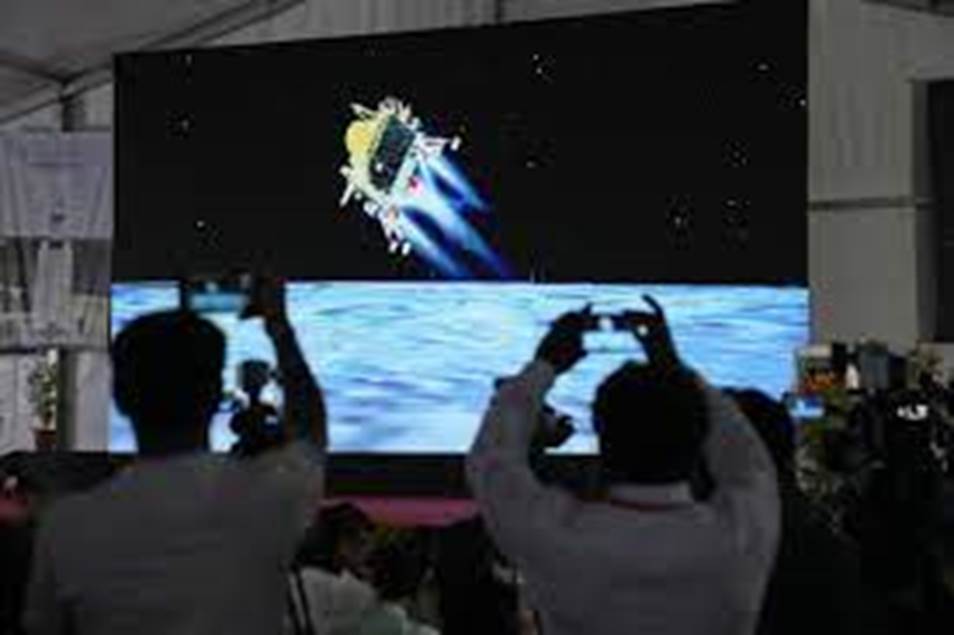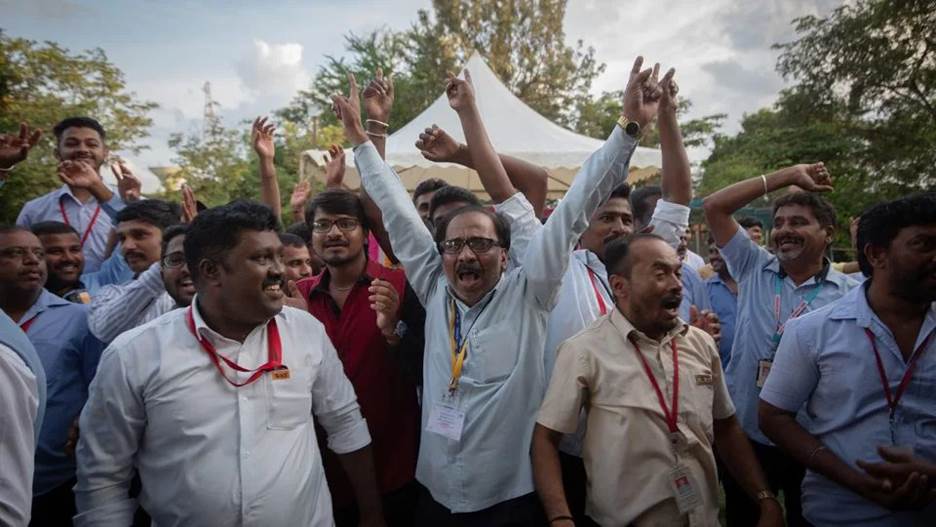
The history-making event has become an immense source of pride for the country of 1.4 billion - Los Angeles Times
‘India Is on the Moon’: Pride and Joy as Lunar Landing Burnishes Country’s Image
By Rhea Mogul, Manveena Suri and Vedika Sud, CNN
Indians around the world have united with pride and excitement after the South Asian nation on Wednesday became the first country to soft land a spacecraft on the moon’s unexplored South Pole , and only the fourth country to reach the lunar surface.
A lander named Vikram and a rover called Pragyan, robots from India’s Chandrayaan-3 mission, touched down on the moon just after 6 pm local time – a moment watched by 70 million people on the Indian Space Research Organization (ISRO)’s YouTube page.
“We have achieved soft landing on the moon,” said ISRO chairman S. Somanath to thunderous applause in the control room. “India is on the moon.”
The history-making event has become an immense source of pride for the country of 1.4 billion as it takes challenging steps to become a space pioneer and cement its status as a global power.
Chandrayaan-3’s success has brought together a nation struggling at a time of deep communal strife, with deadly sectarian violence flaring in pockets of the country. It presents a moment of hope and unity to millions who are reveling in ISRO’s achievement.

Employees of the Indian Space Research Organization (ISRO) celebrate after the successful landing of the Chandrayaan-3 mission - Abhishek Chinnappa/Getty Images AsiaPac/Getty Images
Worshipers were seen praying at Hindu temples, mosques and Sikh gurdwaras ahead of its landing. Several schools around the country organized live viewings of the mission and children fervently waved the Indian flag when Chandrayaan-3 touched down on the moon’s surface.
Locals burst firecrackers, distributed sweets in the streets and danced enthusiastically to celebrate the achievement. Chants of “victory to India!” thundered outside the Council of Scientific and Industrial Research in the capital New Delhi.
“I’m very excited,” said Ashish Kumar Verma, who was watching the live stream. “It was a very great moment to witness.”
Another viewer, Charvi Katare, said the moment was “inspirational” for India.
Further south in Mumbai, the city’s beloved police band played a rendition of the popular Indian patriotic song, “We Shall Overcome” in honor of the event.
A host of celebrities, politicians and global icons also lauded India’s effort.
“Congratulations to all the scientists and engineers… the whole team which has made India so proud,” Bollywood superstar Shah Rukh Khan wrote on X, formerly known as Twitter.
Cricket legend Sachin Tendulkar said: “Humble, hardworking women and men, coming together, overcoming challenges, and making our tricolor fly high.”
“India has become a true pioneer in space exploration,” wrote Ursula von der Leyen, the president of the European Union commission.
In a further successful step on Thursday morning, the rover Pragyan exited the Chandrayaan-3 and took its first steps on the moon.
“The Ch-3 rover ramped down from the lander,” ISRO wrote on X. “India took a walk on the moon!”
‘New India’s victory cry’
India has in recent years made huge strides in its space ambitions.
For Prime Minister Narendra Modi, who swept to power in 2014 on a promise of future greatness and nationalism, Chandrayaan-3’s success is particularly exciting. It comes days after Russia’s Luna 25 spacecraft failed to land on the moon, crashing on its surface instead and bringing an end to Moscow’s first lunar landing attempt in 47 years.
For a nation that only gained independence from the British 76 years ago, and one where large pockets of the population remain impoverished, India’s triumph over Russia – a country seen as a space pioneer – is symbolic of the changing world order.
When India launched its first rocket into space in 1963, the country was no match for the ambitions of the United States and the former Soviet Union, which were way ahead in the space race.
Workers from its space agency transported spaceship parts to the rocket launchpad using bicycles. Now, it can say it has orbited the moon and Mars, even breaking records and launching hundreds of satellites at a far lower cost than other space-faring countries.
Its rise in the space game is also indicative of its growth on the global stage… - CNN
CNN’s Jackie Wattles and Sania Farooqui contributed reporting.

